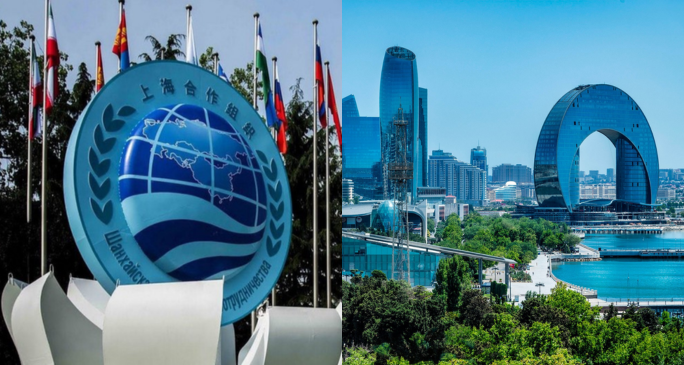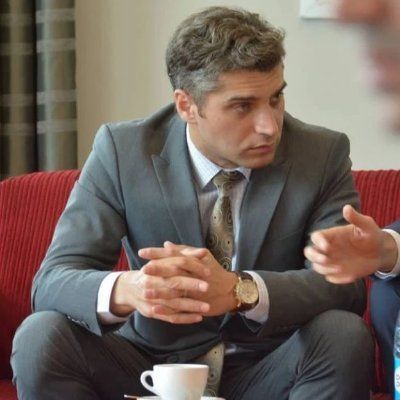Azerbaijan–China relations: political and economic panorama [ANALYSIS]
![Azerbaijan–China relations: political and economic panorama [ANALYSIS]](https://www.azernews.az/media/2025/08/31/add_a_subheading_3.png)
Since establishing diplomatic ties in 1992, Azerbaijan and China have fostered steadily deepening collaboration across multiple fields, including political, economic, infrastructural, and institutional. Azerbaijan’s strategic position along both East–West and North–South corridors has rendered it an essential partner within China’s Belt and Road Initiative (BRI).
Certainly, since the economy is the leading segment at the forefront of all forms of cooperation, it would be more logical to first examine the trade relations between Azerbaijan and China, the world’s second-largest power. Thus, trade has surged, through which bilateral foreign trade turnover rose from approximately USD 1.3 billion in 2018 to USD 3.2 billion in 2023, representing a 2.4-fold increase. In 2024 alone, trade volume rose another 20.7% to reach USD 3.744 billion. China now accounts for nearly 8% of Azerbaijan’s foreign trade turnover and is the leading source of imports at nearly 17.7%.
Besides, Chinese direct investment in Azerbaijan since 1995 has reached USD 920 million, with Azerbaijani investments in China roughly double that figure. Currently, 375 Chinese-capital companies are registered in Azerbaijan (298 active), engaging in infrastructure, liberated-territory projects, and digital transformation, such as Huawei-supported smart-village and smart-city developments.
Moreover, transit and logistics form a vital pillar. Azerbaijan’s Middle Corridor (the Trans-Caspian International Transport Corridor) connects China to Europe via Kazakhstan, the Caspian Sea, Georgia, and Turkiye. It has reduced shipping from 10,000 km to around 7,000 km, cutting transit time, and container traffic has surged 2.5-fold between 2020 and 2024, with projections forecasting a three-fold rise and further cuts to transit time by 2030.
Beyond economics, cooperation spans science, technology, agriculture, telecommunications, culture, and humanitarian exchange. Strategic multilateral frameworks include the Azerbaijan–China Intergovernmental Trade and Economic Cooperation Commission, AIIB-supported projects, multiple Azerbaijan Trade Houses in Beijing, and alignment of the BRI with Azerbaijan’s national strategies, the "Revival of the Silk Road" and the 2030 Socio-Economic Development Strategy.
Behind all these successful forms of cooperation, it is, of course, worth emphasising the role of the strategy and diplomacy pursued by President Ilham Aliyev in advancing Azerbaijan–China relations. The warm relations established between the heads of state of Azerbaijan and China, along with the meetings held to date, provide grounds to state that both sides, alongside shared values, attach great importance to cooperation across all fields.
As for the meetings between the heads of state, one of the most significant took place in Astana. On 3 July 2024, ahead of the SCO Summit in the capital city of Kazakhstan, President Xi and President Aliyev met. They upgraded bilateral relations to a strategic partnership and emphasised deeper cooperation in trade, investment, energy (oil, gas, photovoltaics), and the Trans-Caspian corridor. China reaffirmed support for Azerbaijan's sovereignty, and both sides committed to "high-quality" BRI cooperation.
Further to the meetings, President Aliyev and First Vice-President Mehriban Aliyeva undertook a state visit to China from 22 to 24 April 2025. On 23 April, both leaders held an expanded meeting at the Great Hall of the People with Xi Jinping. President Xi commended Azerbaijan’s achievements, recalled the previous Joint Declaration on Strategic Partnership (signed in Astana), and emphasised cooperation within the UN, SCO, and CICA, alongside mutual support for sovereignty and territorial integrity.
The two leaders formally signed a Joint Statement on the Establishment of a Comprehensive Strategic Partnership, reaffirming mutual political trust, support for each other’s core interests (e.g., Azerbaijan endorsing One-China, China supporting Azerbaijan’s peace agenda), and deeper integration of BRI with Azerbaijan’s development plans.
Later that day, they witnessed the signing of 20 cooperation documents spanning legal affairs, green development, digital economy, intellectual property, aerospace, visa-free travel for ordinary passport holders, renewable energy, agriculture, customs and transport facilitation, and the development of a secure China–Europe Trans-Caspian Express route.
Key political commitments included support for the UN-centred international system, UN reform, multilateralism, opposing protectionism and power politics, advocating global governance reform, and increased representation for emerging economies.
President Xi also underscored the partnership’s significance in safeguarding security, combating terrorism, extremism, and separatism, and expanding cultural and educational exchanges.

Azerbaijan in the Shanghai Cooperation Organisation (SCO)
Azerbaijan is currently a dialogue partner in the Shanghai Cooperation Organisation. It is not a full member but regularly attends summits, including the Astana meeting in 2024, where its strategic partnership with China was reaffirmed, and it was invited by Xi to the current SCO Summit in Tianjin. Its SCO engagement helps integrate Azerbaijan into Eurasian diplomatic and transport frameworks.
It should be emphasised that the strengthening of Azerbaijan’s relations with China, as well as its integration into Eurasian diplomacy and transport networks, has begun to cause concern among certain rival states. Let's take India, which has recently expressed reservations about Azerbaijan (and Turkiye) being dialogue partners at the current Tianjin summit, especially in light of their alignment with Pakistan during Operation Sindoor.
Naturally, India has historically taken an opposing stance, both due to Armenia’s armament and its sharp envy of the Islamabad–Baku fraternal relationship. Today, the growing influence of Azerbaijan as a Eurasian transport hub, particularly on the eastern axis, evidently unsettles Delhi. Nevertheless, Baku always looks forward and consistently asserts its position with firm and effective diplomacy.
Then, taking a more optimistic approach, let us highlight the key points and expectations surrounding President Ilham Aliyev’s current working visit to China.
Although the April 2025 visit has concluded, reflections on its expectations and outcomes remain pertinent.
Azerbaijan’s current working visit to China, undertaken by President Ilham Aliyev alongside First Vice‑President Mehriban Aliyeva, carries substantial strategic significance. Expectations prior to the visit could be deepening of the strategic framework through establishing a comprehensive strategic partnership, enhancing BRI alignment, especially in green energy, digital economy, and aerospace. Besides, among the foremost expectations is the acceleration of bilateral trade, aimed at boosting momentum across existing sectors while expanding access to agriculture, renewable energy, and high-technology industries. Beyond trade, the visit prioritises transit cooperation, particularly the advancement of infrastructure along the Middle Corridor connecting China to Europe, a key route for regional logistics and economic integration.
Equally important are cultural and people-to-people ties, with the goal of broadening visa-free travel, educational and tourism exchanges, and sub-national cooperation initiatives. The visit also underscores the commitment of both states to global governance, strengthening multilateral collaboration within the United Nations, the Shanghai Cooperation Organisation (SCO), the Conference on Interaction and Confidence-Building Measures in Asia (CICA), and in areas such as climate action, security, and trade reform.
Several concrete results have already emerged from the visit. A comprehensive strategic partnership between Azerbaijan and China has been formally established, accompanied by the signing of 20 cooperation agreements covering a broad spectrum of sectors. Both sides expressed mutual support on key national interests, reaffirming commitment to territorial integrity, the One-China principle, and UN reform initiatives. Logistics gains were highlighted through initiatives aimed at customs facilitation and the development of a secure Trans-Caspian Express route for cargo transit. In addition, channels for trade and investment have expanded, particularly in green development and the digital economy.
Despite these accomplishments, several expectations remain for the near future. The agreements reached will require translation into tangible projects, particularly in renewable energy systems, legal frameworks, and digital-economy infrastructure. Trade diversification remains a priority, especially in green and agricultural goods, alongside enhancements in Middle Corridor efficiency and clear timelines for transport development. Broader cultural and institutional exchanges, including academic and youth engagement, are also anticipated to strengthen ties. Finally, continued policy alignment in global forums—including UN Security Council reforms, climate governance, and the broader global trade architecture—remains a critical objective for both countries.
In a nutshell, the visit represents a multi-dimensional effort to deepen Azerbaijan–China relations across economic, logistical, cultural, and diplomatic spheres. While notable progress has already been achieved, the real measure of success will lie in the implementation of these agreements into sustainable, high-impact projects that reinforce both regional connectivity and strategic partnership.
Here we are to serve you with news right now. It does not cost much, but worth your attention.
Choose to support open, independent, quality journalism and subscribe on a monthly basis.
By subscribing to our online newspaper, you can have full digital access to all news, analysis, and much more.
You can also follow AzerNEWS on Twitter @AzerNewsAz or Facebook @AzerNewsNewspaper
Thank you!

